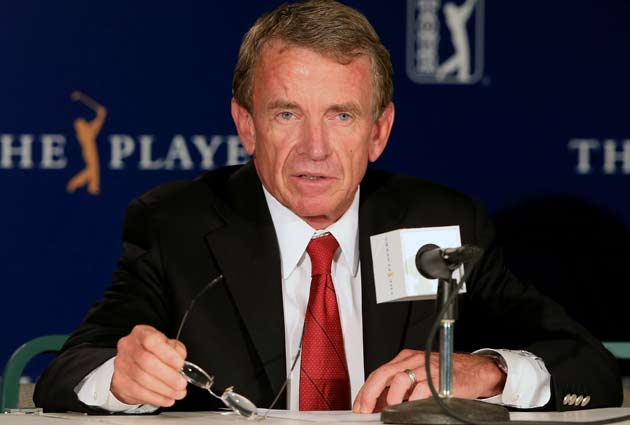Finchem On Augusta: Too Important To Be Consistent With Our Anti-Discrimination Policies
/Oh the comedy of listening to Tim Finchem answer questions about the PGA Tour's double standard on for-profit country club discrimination. Namely, Augusta National's refusal to admit women is okay because they are too important, but those other measely tour events at courses that discriminated against African Americans? Eh...
PGA Tour Commissioner Tim Finchem said Wednesday the Masters is "too important" for the tour to take it off its official schedule, even though Augusta National has never had a female member in its 80-year history.
"We have concluded a number of times now — and we have certainly not moved off of this — that we are not going to give up the Masters as a tournament on our tour," Finchem said. "It's too important. And so at the end of the day, the membership of that club have to determine their membership. They are not doing anything illegal."
Finchem spoke at a news conference that featured The First Tee announcing a new corporate partner. The First Tee tries to attract kids of diverse backgrounds to golf.
 Steve Elling summed up the irony/hypocrisy/absurdity of Finchem's stance Wednesday.
Steve Elling summed up the irony/hypocrisy/absurdity of Finchem's stance Wednesday.
“We concluded -- we have concluded a number of times now and we have certainly not moved off of this -- that we are not going to give up the Masters as a tournament on our tour,” Finchem said Wednesday. “It's too important.”
Speaking at his annual press confab at the Players Championship, Finchem moments later welcomed two men of African-American descent to the dais to discuss the national First Tee program, which was founded in 1997 to bolster -- get this -- the number of minorities in the game.
Oh, the levels of irony, huh?
I'm pretty sure any dreams the Commish had of a cabinet appointment in the next administration (Obama or Romney!) went out the window with today's comments. Well, there's always PV for you, Commish!
Here is the full question and answer from the transcript:
Q. With Augusta National's all‑male membership again an issue at this year's Masters, how does the PGA TOUR view its discriminatory policy?
COMMISSIONER FINCHEM: Well, I think the position of the PGA TOUR hasn't changed. We have a policy that says that when we go out and do a co‑sanctioned event, we are going to play it at a club that is as open to women members, open to minority members, etc., and we follow that policy carefully.
In the case of the Masters, we concluded‑‑ we have concluded a number of times now, and we have certainly not moved off of this; that we are not going to give up the Masters as a tournament on our tour. It's too important. And so at the end of the day, the membership of that club have to determine their membership. They are not doing anything illegal.
But we just elect to continue to recognize them as an official money event on the PGA TOUR because we think it's that important to golf, so we don't get to determining whether their policies are right or wrong, because we don't have to, because we made the conclusion that regardless of those policies, we are going to continue to play and recognize them as part of the PGA TOUR.
I know some people don't like that position, and I appreciate that and I understand their reasoning, but that's the decision we've made.
**Golf Digest's Stina Sternberg says "The commissioner's response defied second-grade logic" when he reiterated the tour policy to not visit clubs who discriminate and then suggested there was one prominent exception.
That's right, Mr. Finchem, Augusta National is not doing anything illegal. Indeed, we live in a free country. But Augusta is going directly against the anti-discrimination policy you follow so "carefully," yet you choose to look the other way because the tournament is "too important"? That reaches a level of hypocrisy that has rarely been delivered with a straight face by anyone in your position.












